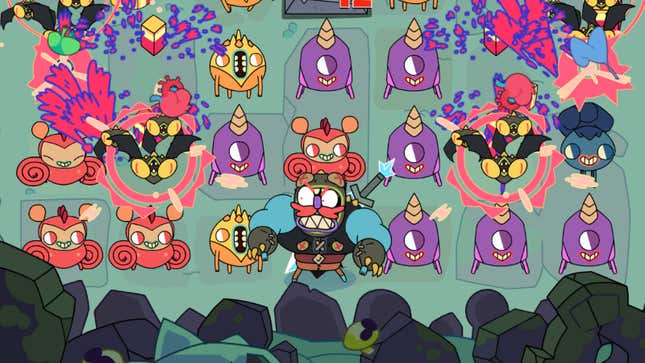
Grindstone is probably the best mobile game I’ve ever played. I’ve spent much of my downtime over the last few days fighting through its monster-slaying puzzles. There’s just one thing: I would prefer to simply buy it rather than playing it through my Apple Arcade subscription.
Apple Arcade is a fairly new subscription service that charges users $5 a month for access to an avalanche of excellent mobile games. I decided to dive into its offerings after a recent update made the service accessible on my iPhone. The first trial month is free, and during that time, I’ve been going down the list of Stephen and Mike’s favorite games to try and decide whether my subscription is worth keeping. Some of the games that others have loved, like Card of Darkness and Mini Motorways, were frustrating to me (maybe I’m just not very smart), but I immediately fell in love with Grindstone.
Developed by Sword & Sworcery and Below creators Capy Games, Grindstone puts you in the shoes of a hulking barbarian who is tasked with traveling up a mountain and slaying hordes of cute but deadly monsters. You rack up combos by defeating as many of the color-coded enemies as possible with a single, unbroken line. Deducing clever ways to string together hits and gathering resources has proven to be mighty compelling to my lizard brain. The only problem is that the end of my free month of Apple Arcade is still looming overhead, and this is the only game I want to keep playing. It’s made me realize that I’d rather just purchase the game from the developers outright instead of chaining myself to a service that removes all sense of ownership from the equation.
Digital media is inherently tricky. While you technically own the movies, albums, and video games that you purchase, they’re still susceptible to the whims of copyright protection methods. Oftentimes, this means that the pieces of media you “own” are still intrinsically tied to whichever digital storefront or proprietary media player that you used to make your purchase. Subscription services like Apple Arcade only exacerbate this problem because they become the only place to watch, listen to, or play this digital media. My hard copy of the Kevin Smith movie Dogma, for instance, is precious to me because you can’t watch it online anywhere—at least, not legally. Lions Gate Films’ unfathomable decision to not make it available on streaming services doesn’t affect my VHS copy. It’s easy to understand why this might not sit well with the major corporations of the world: they’re no longer making any money from it while it’s sitting on my shelf.
There’s also the issue of devaluation, which was brought up by Maddy and Kirk on an episode of Kotaku Splitscreen last month. When hundreds of games are accessible for just $5 a month, why would anyone drop that much money on a single mobile game again? Hell, why pay $20? Or, god forbid, even $60? And unlike movies on Netflix or music on Spotify, there sometimes isn’t an option to purchase Apple Arcade games elsewhere. My worry is that this system won’t be sustainable for anyone but Apple, and developers will get fleeced by contracts and stipulations when they could have had an actual hit on their hands if they had decided to release their games traditionally and hadn’t tied it to a third-party subscription service. These are complicated, time- and labor-intensive projects, and the people who work on them deserve to be compensated fairly.
I want game developers to be fairly compensated, of course, but I admit, I don’t want to pay $5 a month for a ton of games that I’m not actually playing either. Grindstone is fantastic, so much so that it might even be worth renewing my Apple Arcade subscription for another month, but I don’t know where my $5 is going, exactly, and I’m not really interested in anything else the platform’s library has to offer. What I really want is to feel, no matter how fake the feeling might be in this new digital age, like I own the game on which I’m being asked to spend money, not to mention that the developers are getting their fair share for their labor. I’m willing to fork over at least $20 for this game, Capy. Just let me know where to send the check.